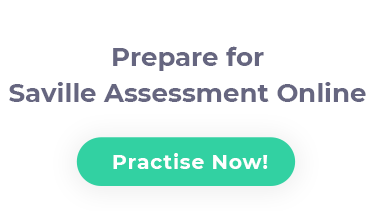Saville Executive Aptitude Test Preparation & Tips – 2025

Saville tests have become a common means of screening applicants, and one of the popular choices for pre-employment psychometric testing is the Saville Executive Aptitude test. The test allows employers to assess graduates and job seekers for key skills necessary to the job through an online platform in the initial screening stage or further along in the recruitment process.
What Is the Saville Executive Aptitude Test?
Saville Executive Aptitude Tests are actually a combination of three different test types: numerical, verbal, and abstract reasoning. The battery of exams is widely used for selection and assessment with grads, managers, professionals, or senior managers.
The tests can be done online with the Swift version or in assessment centres as a longer version. The online Swift version gives the test in three sections with six minutes to a section. There are twenty-four questions in total split between the sections. A high score on the test will help applicants pass through to the next stage in earlier stages. If taken at the higher stages of screening, results typically end up being evaluated with interviews and other assessments.
What to Expect on the Saville Executive Aptitude Test?
As mentioned earlier, these tests are timed. The Swift version online is timed at eighteen minutes total while the standard version takes varying amounts of time depending on the assessment centre and the number of questions presented. The standard version is typically more difficult than the Swift version.
The verbal reasoning section will test the candidate’s aptitude for comprehension, analysis, and interpretation of written information as well as ability to work with vocabulary, spelling, grammar, critical reasoning, and comprehension.
The numerical reasoning section assesses the applicant’s ability to understand and interpret numerical information on the format of graphical and statistical representations. The assessment presents a series of dual and single data sets with a few questions to answer on each set.
The abstract reasoning section tests applicants’ comprehension and evaluation of sequences of patterns and relationships. This is done through presenting panels and illustrations that define logical processes followed by questions that can be answered with the information in the preceding panels and illustrations.
How to Prepare for Saville Executive Aptitude Tests?
Like any psychometric aptitude test, preparation and practice is key to success with the Saville Executive Aptitude Test. How you prepare may depend slightly upon which format of the test you are taking. If you are taking the online Swift version, you may need less preparation than you would if you were taking the standard version at an assessment centre.
The important thing is to put in enough time. The questions are similar in approach, so the materials you use to study should be similar regardless of which format you have to take. But the difficulty of the questions you face will be higher if you take the standard version of the test instead of the Swift version. Take the time to figure out which one you will be taking. Do not underestimate how helpful it is to prepare ahead of time and familiarize yourself with the format of the test you are taking.
Tips for Taking a Saville Executive Aptitude Test
- Read newspapers and other business-related material to improve your comprehension speed.
- Play crosswords and word games to increase your vocabulary.
- Brush up on grammar and spelling skills before the test.
- Do math problems and word problems with graphs to improve your speed with numerical data.
- Practice working with statistical data and diagrams to give you a better chance at success on the numerical section of the test.
- Do puzzles and logic games to increase your aptitude for abstract reasoning.
Conclusion
The Saville Executive Aptitude Test is not the most daunting test to face with proper preparation and practice. Graduates or job-applicants facing Saville testing should simply ensure that they have spent enough time covering practice tests and sample problems like those on the test they are taking that they feel confident. Confidence, familiarity, and a solid grasp of the material will ensure a good score on this test.

